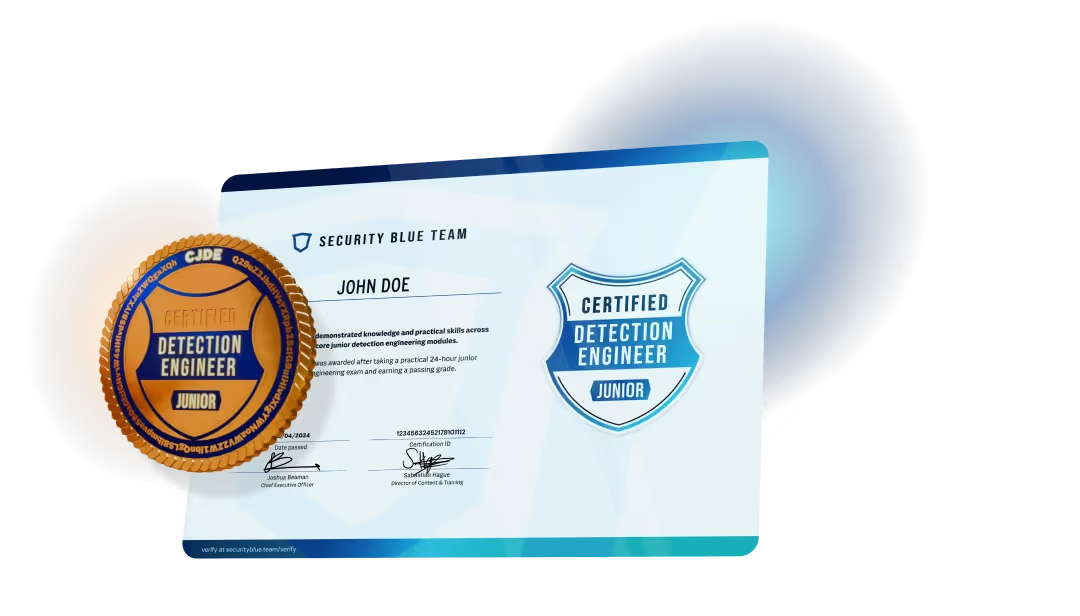
Certified Junior Detection Engineer (CJDE)
Lessons available in 9 languages with native text-to-speech (beta)
The CJDE (Certified Junior Detection Engineer) course provides a pathway into detection engineering and cyber security operations, focusing on identifying, analysing, and responding to threats using detection tools and strategies. It is ideal for roles such as Junior Security Analysts, Detection Engineers, SIEM Administrators, Incident Response Analysts, and SOC Analysts, and is suited to individuals with foundational cyber security knowledge who wish to specialise in detection and response or enhance their existing skills.
Skills you'll gain
Certified Junior Detection Engineer (CJDE)
The CJDE (Certified Junior Detection Engineer) course provides a pathway into detection engineering and cyber security operations, focusing on identifying, analysing, and responding to threats using detection tools and strategies. It is ideal for roles such as Junior Security Analysts, Detection Engineers, SIEM Administrators, Incident Response Analysts, and SOC Analysts, and is suited to individuals with foundational cyber security knowledge who wish to specialise in detection and response or enhance their existing skills.
Recommended experience
1-3 years experience
Estimated time to complete
approximately 40 hours to complete
On-demand access
Complete in 4 months
Training and exam price
£399.00 GBP
NICE Mapping
Infrastructure Support
57% Topics, 68% Knowledge, 81% Skills
Who is the course for?
CJDE is perfect for security professionals that want to develop their practical detection engineering skills. Roles that we believe would benefit from this course include:
- Security Analysts
- Incident Responders
- Threat Intelligence Analysts
- Security Engineers
- Detection Engineers
Whilst our content is aimed primarily at entry-level or junior roles, read our course syllabus to see if CJDE is the right choice for you or your team!
Why choose CJDE?
CJDE is designed to train students that are capable of responding to threat intelligence reports and are able to build test and deploy detections in your environments. Below are some examples of the skills and experience you will gain.
- Automate detection workflows with git.
- Creating and tuning network detection rules
- Creating and tuning Sigma Rules
- Utilising AI in detection engineering flows.
- … And much more
The skills and tools you’ll learn in this course will be directly applicable to a range of security roles, and are actively used by defenders around the world.
About the Course
2 topics
What you'll learn
Lessons
- Welcome to the CJDE!
Networking Essentials
Windows Essentials
Linux Essentials
Python Essentials
Incident Response Essentials
Git Workflows for Detection Engineering
Network Analysis Essentials
Yara & Sigma Essentials
Zeek Essentials
Malware Analysis for Detection Engineering
Detection Rule Creation and Tuning
Threat Intelligence Integration for Detection
Behavioural Analytics for Threat Detection
AI for Defenders
CJDE Exam Preparation

Frequently asked questions
Will CJDE help me land my first detection job?
It gives you the skills hiring managers are looking for. CJDE is built to get you job-ready by focusing on the real tools, scenarios, and workflows used in modern detection environments.
Can I take CJDE if I already work in IT or another area of cyber?
Yes. If you’re pivoting into detection roles or want to build detection-specific skills, CJDE helps bridge the gap and give you the confidence to step into a SOC role.
How is CJDE different from other junior cyber courses?
Most junior courses focus on broad cyber theory or compliance. CJDE is purpose-built for detection engineering. You’ll learn how to think and work like a junior detection engineer in a SOC environment, using the same tools and workflows.
What does the certification prove?
CJDE shows you can do the job. It’s a skills-first certification focused on detection engineering. You’ll leave with a portfolio of applied skills and a credential that helps you stand out in a crowded entry-level job market.
Is CJDE hands-on or just theory?
It’s practical from day one. You’ll learn detection engineering by doing, from working with real SOC tooling like Zeek, Splunk, and Elastic to managing CI/CD pipelines using Git.
How long does it take to complete CJDE?
The course is self-paced. Most learners will finish in 40-60 hours depending on their schedule and how deeply they engage with the labs and materials.
Do I need prior experience in detection engineering?
Whilst it would help, no. CJDE is made for junior level professionals with 1-3 years’ cybersecurity experience. You’ll start with the basics and build up to real-world detection skills using industry-standard operational tools. If you’re a junior level analyst and possess curiosity about threat detection, you’re ready.





